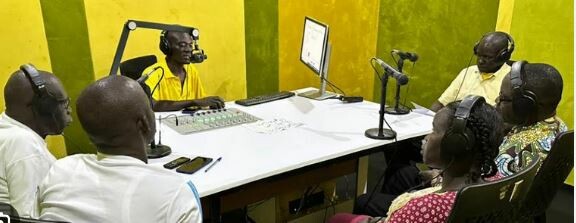While digital technology dominates the modern means of transmitting information, a cross-section of South Sudanese over the weekend said that radio remains the primary source of information for most people in the country.
The citizens who spoke on Radio Tamazuj say radio remains a source of entertainment, information, and cultural expression, and provides an emotional connection with its listeners.
Sarah Zakaria Mel, a resident of the New-site suburb of Juba, said radio is an important media tool that remains a reliable and credible source of information.
“Those who do not have television sets, listen to the radio to get informed about what is happening around the country, especially on prices of commodities in the market and incidents taking place in the states or Juba,” he stated. “Radio plays an important role in our lives, especially during conflicts like the one which recently erupted in Sudan and people can easily get information about what is happening through the radio.”
Proclaimed in 2011 by the Member States of the United Nations Educational, Scientific and Cultural Organization (UNESCO) and adopted by the United Nations General Assembly in 2012 as a UN International Day, February 13 became World Radio Day (WRD). Radio, as a technology, science, means of communication, and system of programming audio elements has roots back to the 1800s.
The day was set aside to celebrate radio broadcasts, improve international cooperation among radio broadcasters, and encourage decision-makers to create and provide access to information through radio, including community radios.
This year’s theme for World Radio Day is Radio: “A century informing, entertaining and educating.” The theme shines a broad floodlight on radio’s remarkable past, relevant present, and promise of a dynamic future.
John Wulu Deng, the Station Manager of Top FM, a local community radio station in Juba, said radio is still vital.
“In today’s digital environment, radio still plays a vital role in people’s lives as well as in marketing, and as radio continues to live in different content and delivery platforms, it is important to understand its history, its change and role in the world,” he emphasized. “Our listeners benefit from radio through community programs and they are benefiting from news and they are benefiting from advertisement and through civic education.”
Wulu added: “Now we are approaching to elections, how are they going to understand the electoral processes and how to be elected and where they are going to vote? So, all these things will be done through radio and the different communities living in Juba will benefit a lot from Top FM.”
According to Deng Achol, a Juba-based freelance journalist, radio has remained popular, especially in areas where mobile telephone networks are patchy or absent.
“Radio will remain important because it is an affordable key instrument in disseminating information. It is the only means of communicating with the public and it reaches the grassroots compared to other technologies that emerged recently,” said Achol. “With radio, the information that is disseminated today is timely. The community also benefits from short clips compared to vast writing because the illiteracy rate in South Sudan is high. The number of people who read is less compared to the number of people who listen to the radio.”
For Edmund Yakani, a renowned South Sudanese civil society activist, radio will remain an effective communication tool.
“I think radio plays a very instrumental role in our lives in a sense that radio draws the attention of listeners or audience in very creative ways that you manage between sound and listening to the information,” he said. “So, the aspect of having sound attached to the radio makes it an effective communication tool and I feel radio will remain dynamic in our lives.”
Yakani said radio remains a dominant medium compared to others like newspapers and television.
“If you go to villages where there is no electricity and or no modern technology or incomes to buy newspapers, radio remains free and is more accessible,” he added.
Meanwhile, Dut Majokdit, a senior opposition figure and the chairperson of the Relief and Rehabilitation Commission in Northern Bahr el Ghazal State, said the time is coming when radio will not be marketable due to advances in technology.
“People are thinking about how information can be given to the public but radio now belongs to the 20th Century,” he said. “Everything is changing as social media has taken the attention of everybody and people are on Facebook and other websites where they get more information about what is happening around the country, region, and the world.”
“So, I think the time is coming when radio will not be marketable because technology is now changing,” Majokdit concluded.




